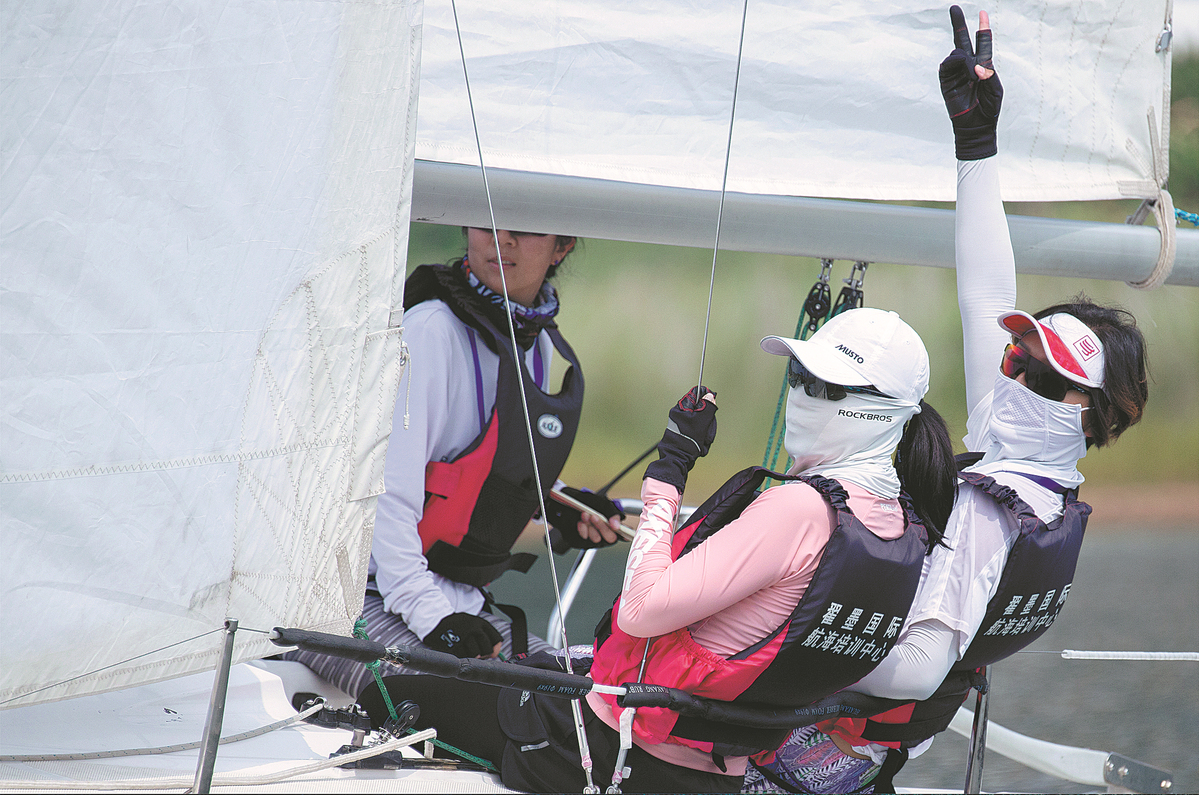Sailing enthusiasts take to the water in numbers


Mind over matter
Wang Haigang, 41, an architect who designs ski centers, became interested in sailing, and trained with instructors at almost the same time as Xu, the construction manager.
"It's like training for a soccer game, where teamwork between players and confrontation with the opposition matter the most. The entire sailing process is about learning," Wang said.
Sailing is largely for leisure, but mastering the tactics can be mentally challenging and affect every racing experience.
"A strong wind brings speed and added enjoyment for sailors, but when there is no wind, they are still in a hurry, and that's where sailing challenges the mind. A positive mental approach is usually the difference between victory or defeat in a competition," Wang said.
"It is important for sailors to remain calm. Due to variable winds, you have to change course and stay focused all the time, which requires both physical and mental strength."
A crew of two or more typically pilots a sailboat at different times, which requires a high degree of teamwork based on wind direction.
A sailboat should be steered into a headwind so that the crew can pilot the vessel smoothly.
"Sailing into the wind requires tacking, and the crew must decide the number of headwind turns needed to sail against the wind," Wang said. Tacking is a basic maneuver in which a boat's bow is moved into the wind to change the vessel's direction.
"More turns mean a loss of speed and time, while fewer turns or tacks require longer voyages. Usually, the sailboat's bow is turned toward and into the wind, with a series of zigzag moves enabling the vessel to be sailed in the desired direction," Wang said.
Winning a sailing competition is important for Wang, but what makes the sport attractive and unique for him is taking part in every sailing competition he is able to enter, and facing numerous challenges on the water.
"Sometimes, practicing sailing on a lake is less effective in improving your ability than joining sailboat competitions," Wang added.
For a competition typically staged over two or three days, Wang said he and his teammates often relax between events to get themselves in a good mood before setting sail again.
In September, Wang and Xu went camping around Jinhai Lake during a break between the first and second day of a sailing competition.
"Retaining a positive mental attitude during a competition enables you to candidly assess the situation and gain a sense of achievement when you pass other participants through sheer determination," Wang said.
Xu, who takes part in sailing competitions with Wang, said the interaction between teammates is what he loves most about the sport.
"I took up sailing because I am interested in it. I've spent a lot of energy, effort and money on the sport, and had discussions with friends and partners who are also interested in it so that we could study sailing together," Xu said. "Only through discussions can we improve more quickly and pursue higher goals."
Contact with nature
Xu has been an avid sailor for the past three years — taking time out from his work to pursue the sport, and spending nearly every weekend from May to November taking to the water. He also enjoys other water sports such as paddleboarding and kayaking.
"When you take up an outdoor water pursuit, you are part of nature, and I believe this is the best way to connect with nature," Xu said.
In addition to improving physical fitness, sailing enables participants to familiarize themselves with the natural environment.
"You gain a much clearer picture of yourself. As each year goes by, the world you explore grows bigger, and you realize how small you are and that you should be humble and respect nature," Xu added.
Lakes in Beijing provide perfect settings for people to take up sailing, and also help popularize the sport, according to Xu.























